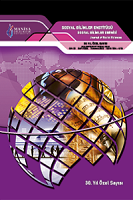Terör Saldırılarının Gelen Turistlerin Ortalama Harcamalarına Etkisi
The Effect of Terrorist Attacks on The Average Spending of Incoming Tourists
Author(s): Kubilay Çağrı Yılmaz, Mehmet SandalSubject(s): Security and defense, Social Theory, Tourism, Socio-Economic Research
Published by: Celal Bayar Üniversitesi Sosyal Bilimler Enstitüsü
Keywords: Terrorist Attacks; Real Exchange Rate; Tourism Spending; Cointegration With Breaks;
Summary/Abstract: Global tourism service production has a fragile structure and is expressed as one of the vulnerable sectors due to possible cyclical developments in this aspect. There are studies in the literature that examine how and in what periods the total tourism demand of terrorism, the short-term and long-term effects and ineffectiveness of shocks, the religious, ethnic and geographical spread of the effects of shocks, and the effects of continuous shocks. This study aimed to focus on the flexibility of the average spending tendencies of tourists to terrorist attacks and real exchange rate changes. For this purpose, using the annual data for the period 1980-2019, the effect of terrorist attacks and the real exchange rate on the average expenditures of tourists coming to Turkey was investigated with the help of the Maki (2012) multiple structural break cointegration test. Increases in terrorist attacks have a weak and negative effect on average spending, while shocks in real exchange rates have a negative and strong effect. It should be stated that the qualitative change of tourists, which may come due to the change in purchasing power for the periods when the real exchange rate increases, may increase the sensitivity to terrorism.
Journal: Celal Bayar Üniversitesi Sosyal Bilimler Dergisi
- Issue Year: 20/2022
- Issue No: Sp. Issue
- Page Range: 29-42
- Page Count: 14
- Language: Turkish

